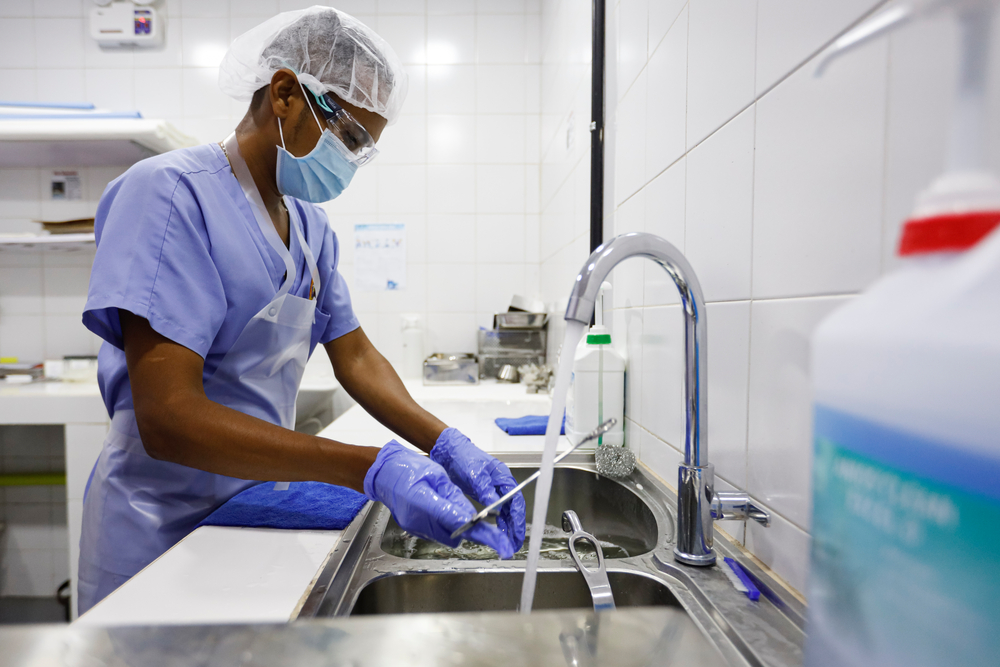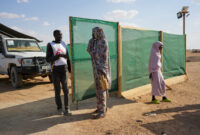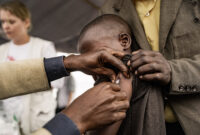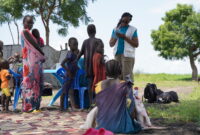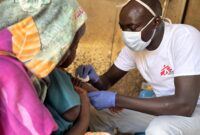Venezuela: MSF teams provide clean water access to improve the quality of medical care in the state of Bolivar
“Having consistent, quality water allows the hospital to receive patients and provide them with safe care.”
Carlos, age 4, stares at a group of children not much older than him, who are bathing and playing in a stagnant water well in front of his house. The young boy lives with his family and a hundred other families in the rural community of La Montañita, in the state of Bolívar, in southeastern Venezuela.
While Carlos longs to join the group of children, his mother, Kavilis, won’t allow it. The body of water is known by the community as “el Tapón,” and it is a potential vector that poses a risk to people’s health and the community in general.

At the José Gregorio Hernández Hospital in Tumeremo, the capital of the Sifontes municipality, the organization Doctors Without Borders/Médecins Sans Frontières (MSF), in conjunction with a team from the Institute of Public Health of the state, receives patients who have been exposed to water-related diseases in the area.
Since 2019, MSF has been working with the state health authorities to strengthen the health system, supporting medical activities in the Tumeremo Hospital, which serves between 250,000 to 300,000 inhabitants, most of them on the move, as they travel to work in the mining area. MSF also supports lifesaving water and sanitation projects and health promotion activities in the area to ensure the prevention and control of infections,
For a rural community that does not have pipelines or a regular water system, the “tapón” is often an alternative place for bathing and provides water for cooking and cleaning their homes. It serves as the only local water well but has no drainage and often becomes the destination for animal waste from a nearby farm.
“Many times, we get sores on our skin because we have no choice but to go to the well when it hasn’t rained for days. We do everything we can so that Carlos doesn’t have to go there, but sometimes we have no other choice,” Carlos’ parents say.
Quality water is indispensable for effective healthcare
For any health center, access to safe water is essential. Having constant, quality water prevents the spread of diseases not only in the hospital but also in the community and the populations on the move that resort to the medical care provided by the municipality health structure.
Among the many projects that have been carried out, MSF has given special attention to the water and sanitation component, ensuring the availability of constant, treated, quality water in the hospital—24 hours a day, seven days a week—by replacing the network of clear water pipes and replacing the pumping system to all areas of the hospital. MSF also provides donations of essential supplies, and training for medical and non-medical staff and manages the disposal of hospital waste. In conjunction with the health center staff, MSF teams have rehabilitated the sterilization room and built a laundry that also supplies with cleaning materials.
“The impact the sterilization room has had is very important. Having consistent, quality water allows the hospital to receive patients and provide them with safe care,” explains Evelyn Palacios, MSF infection control and prevention supervisor.
Each person who comes to the hospital can wash their hands, take their treatment thanks to drinking water points, and benefit from the clean and disinfected spaces of the hospital. In the health structure, everything from a stretcher, before and after delivery, to the emergency corridors, is sanitized. In-depth disinfection is not limited to medical instruments and hospital areas, but also to the hygiene and disinfection, that keeps health workers safe.
Health promotion and community involvement also save lives
MSF’s team of health promoters visits communities to conduct educational sessions on proper water treatment, drinking water purification, water-related diseases, and hygiene tools for themselves and their loved ones.
These counseling sessions provide the population in rural areas with practical alternatives, so that they themselves can manage their own safe water. Together, they reinforce the importance of good water treatment, disposal, storage, and consumption to empower communities to take control of their health.
In 2022, MSF sensitized 130,264 people through health promotion and distributed 11,350 water purification tablets in the state of Bolivar. MSF also installed 31 hand-washing stations and 211 water points for patients and their families to drink. Carlos and his family are part of those thousands of people in Bolivar who benefit from better service and access to water, which allows the hospital to be operational to provide quality medical care. In their homes, the word has spread and more and more patients are trusting in a health system that provides safe spaces for its workers, patients, and families.
